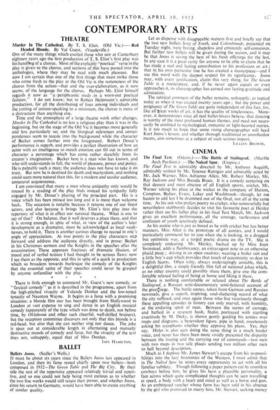CONTEMPORARY ARTS
THEATRE
ONE of the many things which excited those who saw at Canterbury eighteen years ago the first production of T. S. Eliot's first play was
his handling of a chorus. Most of the explicitly "poetical" verse in the play is given to the chorus, and sections of this have passed into the anthologies, where they may be read with much pleasure. But now I am certain that one of the first things that must strike those who come fresh to the play at the Old Vic is the remoteness of the chorus from the action—that and the over-elaboration, as it now seems, of the language for the chorus. Perhaps Mr. Eliot himself regards it now as "a-periphrastic study.in, a worn-out poetical fashion." I do not know; but in Robert Helpmann's admirable production, for all the distributing of lines among individuals and the cutting of unison-speaking to a minimum, the chorus is more of a distraction than anything else.
Time and the atmosphere of a large theatre work other changes. Murder In The Cathedral is no less a religious play than it was in the beginning, but on the stage of the Old Vic it becomes more generally and less particularly so; and the liturgical references and corres- pondences seem to recede into the background, while the character of Becket comes further into the foreground. Robert Donat's performance is superb, and provides a perfect illustration of how an actor with an intelligence to match emotion can fill out in terms of character a personage which has come rather sketchily from its creator's imagination. Becket here is a man who has known, and who still understands in full, the world of pleasure, power and policy. He is palpably such a man; the audience does not have to take it on trust. But now he is destined for death and martyrdom, and nothing could seem more natural than this, for a modern and secular audience, unnatural acquiescence.
I am convinced that many a man whose antipathy only would be roused by a reading of the play finds instead his sympathy fully engaged by Mr. Donat's playing of the principal part. His is a voice which has been missed too long and it is more than welcome back. The occasion is notable because it returns one of our finest actors, and also because it brings Mr. Eliot's first play into the repertory of what is in effect our national theatre. What is one to say of that? On balance, that it well deserves a place there, and that it is strong enough, in spite of what, in view of the author's later development as a dramatist, must be acknowledged as local weak- nesses, to hold it. There is another curious change to record in one's angle of appreciation. At two points in the play characters step forward, and address the audience directly, and in prose: Becket in his Christmas sermon and the Knights in the speeches after the assassination. These apparent fractures of dramatic illusion, of mood and of verbal texture I had thought to be serious flaws: now I see them as the opposite, and this in spite of a quirk in production which so broadens towards burlesque the comedy of the Knights that the essential satire of their speeches could never be grasped by anyone unfamiliar with the play.
There is little enough to commend Mr. Guest's new comedy, or "farcical comedy" as it is described in the programme, apart from the high-pitched vivacity of Yolande Donlan and the low-toned tenacity of Naunton Wayne. It begins as a farce with a promising situation: a blonde film star has been brought from Hollywood to London at vast expense to sing and dance in an English musical comedy (apparently of the type which was done to death, not before time, by Oklahoma and other such cheerful, well-drilled bruisers), but the reception committee discovers not only that this blonde is a red-head, but also that she can neither sing nor dance. The joke is spun out at considerable length in alternating and mutually destructive moods of comedy and farce, but the vivacity of the text does not, unhappily, equal that of Miss Donlan. -
IAIN HAMILTON.


































 Previous page
Previous page